Many believe a call center and BPO (Business Process Outsourcing) are the same, but that’s far from true. While both focus on customer interaction and efficiency, their scope differs vastly.
In fact, the global contact center market is valued at USD 36.21 billion in 2025 and expected to hit USD 48.58 billion by 2033. In contrast, the global BPO market exceeded USD 340 billion in 2025, showing how much broader it is.
This blog breaks down their core differences, benefits, and why understanding them matters for your business growth.
What Is BPO (Business Process Outsourcing)?
BPO is an abbreviation for Business Process Outsourcing. The basic meaning of BPO is that it outsources business processes to companies. BPO provides services like accounting, payroll, customer service, other human resource management processes, billing, etc.
BPOs handle the processes assigned to them by the companies efficiently and provide desired results to the organization by scaling their processes effectively. They are basically third-party providers that are proficient in accomplishing the processes skillfully and in a cost-effective manner.
Develop a reliable IVR that routes after-hours customer calls based on customers' preferences. This will improve first call resolution rates and allow access to IVR/Support during any hours.
What is a Call Center?
A call center is a calling-based service provider that receives, and routes calls from clients worldwide. Some organizations have call centers within the company, and some outsource to a call center service provider to handle inbound and outbound calls effectively.
Services provided by call centers are related to billing, telemarketing, debt collection, etc. They assist organizations in improving their customer experience by providing effective and seamless communication.
Now onto another important topic, What is the difference between BPO and a call center? let’s have a quick understanding.
What Are the Key Differences Between BPO & Call Centers?
Both BPO (Business Process Outsourcing) and modern call centers focus on delegating specific business functions to third-party providers, yet they differ in purpose, structure, and value delivery.
| Aspect | BPO (Business Process Outsourcing) | Call Center |
|---|---|---|
| Core Function | Manages complete business processes and back-office business operations. | Focuses on handling customer interactions and support. |
| Service Scope | Broad, includes HR, IT, finance, and administrative functions. | Narrow, limited to inbound/outbound communication tasks. |
| Nature of Work | Strategic and process-oriented. | Operational and customer-service-oriented. |
| Required Skills | Domain expertise and technical proficiency. | Customer communication, empathy, and problem-solving. |
| Technology Used | ERP, CRM, RPA, and analytics platforms. | Cloud telephony, IVR, and Cloud call management systems. |
| Primary Objective | Improve efficiency, reduce costs, and deliver exceptional customer service operations quickly. | Improving customer satisfaction and retention. |
| Performance Focus | SLA compliance, accuracy, and productivity. | Call handling time, resolution rate, and CSAT scores. |
| Examples | Payroll processing, technical support, data entry, HR management, market research. | Customer support, telemarketing, helpdesk services. |
Types of Business Process Outsourcing (BPO)
Business process outsourcing is a vast concept, and a lot of processes are handled by the BPO service provider. For effectively understanding the operability of the BPOs it is essential to understand the types of BPOs.
Mainly there are three types of BPO:
- Onshore Outsourcing
- Offshore Outsourcing
- Nearshore Outsourcing
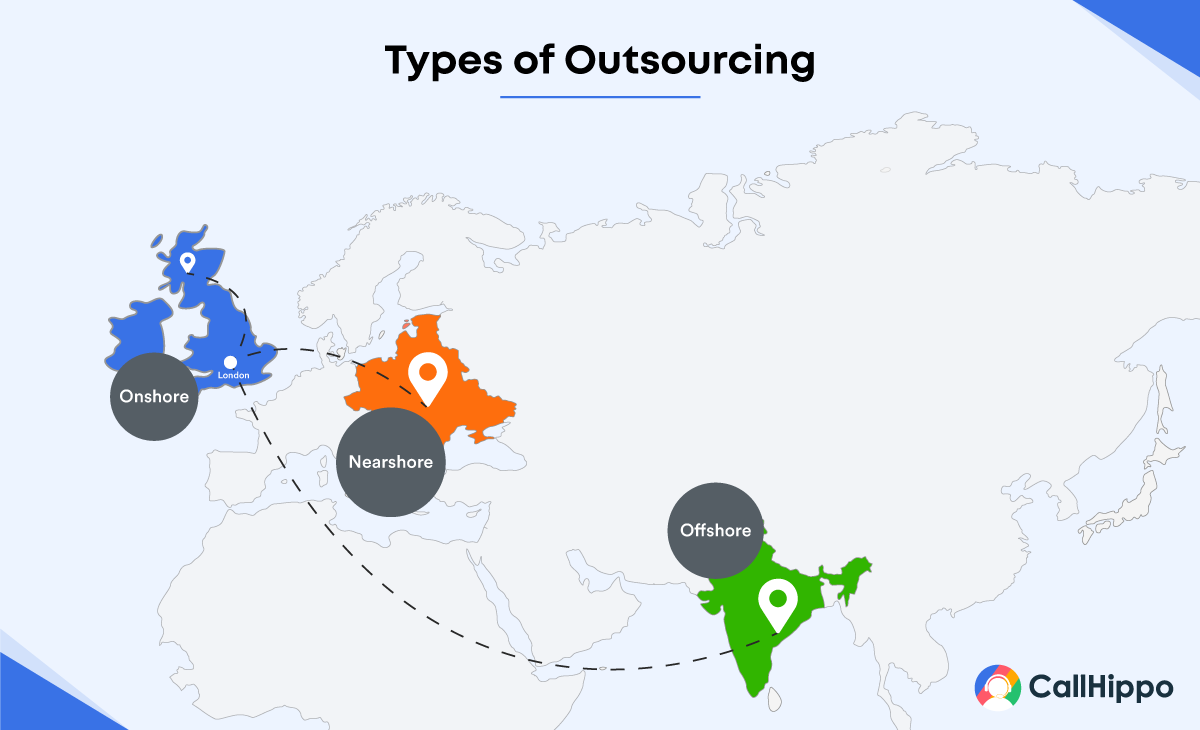
Let’s have a quick overview of all three types of outsourcing.
1. Onshore Outsourcing
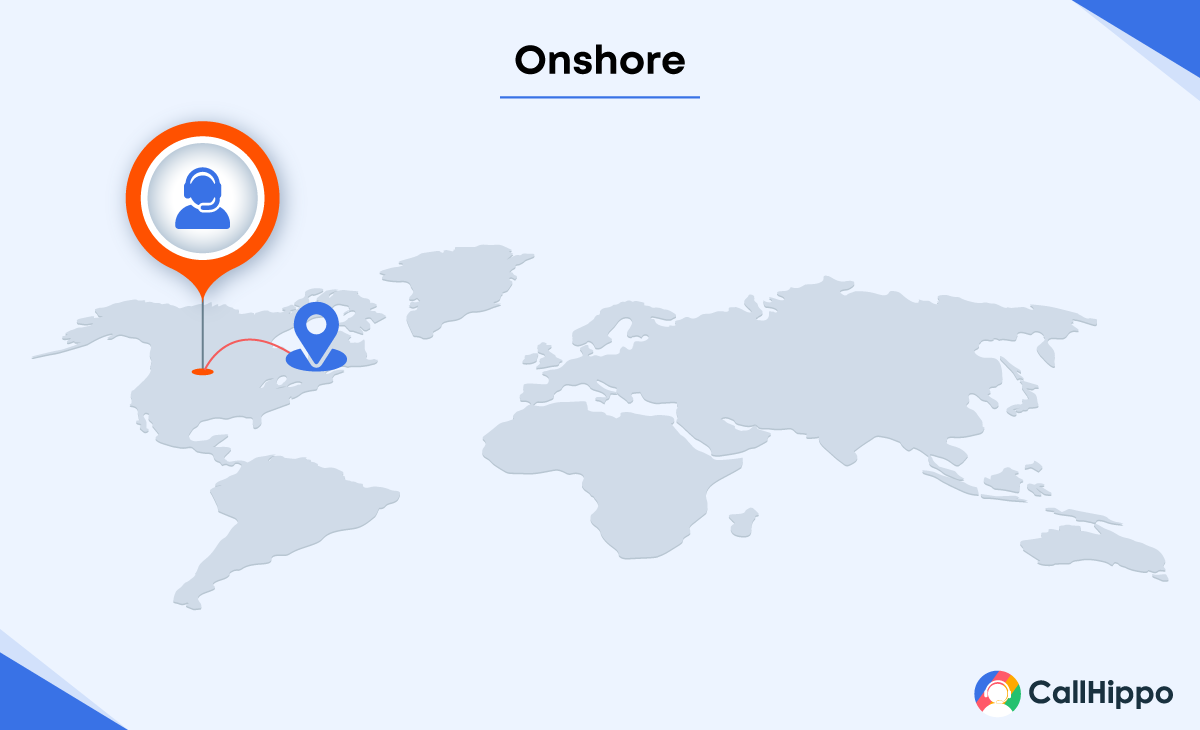
Onshore outsourcing, also called domestic outsourcing, is a process by which an organization employs a service provider based in the same country as that of the organization. Let’s understand onshore outsourcing with an example of Companies in the US outsourcing work to service providers in the same or other states of the US.
2. Nearshore Outsourcing
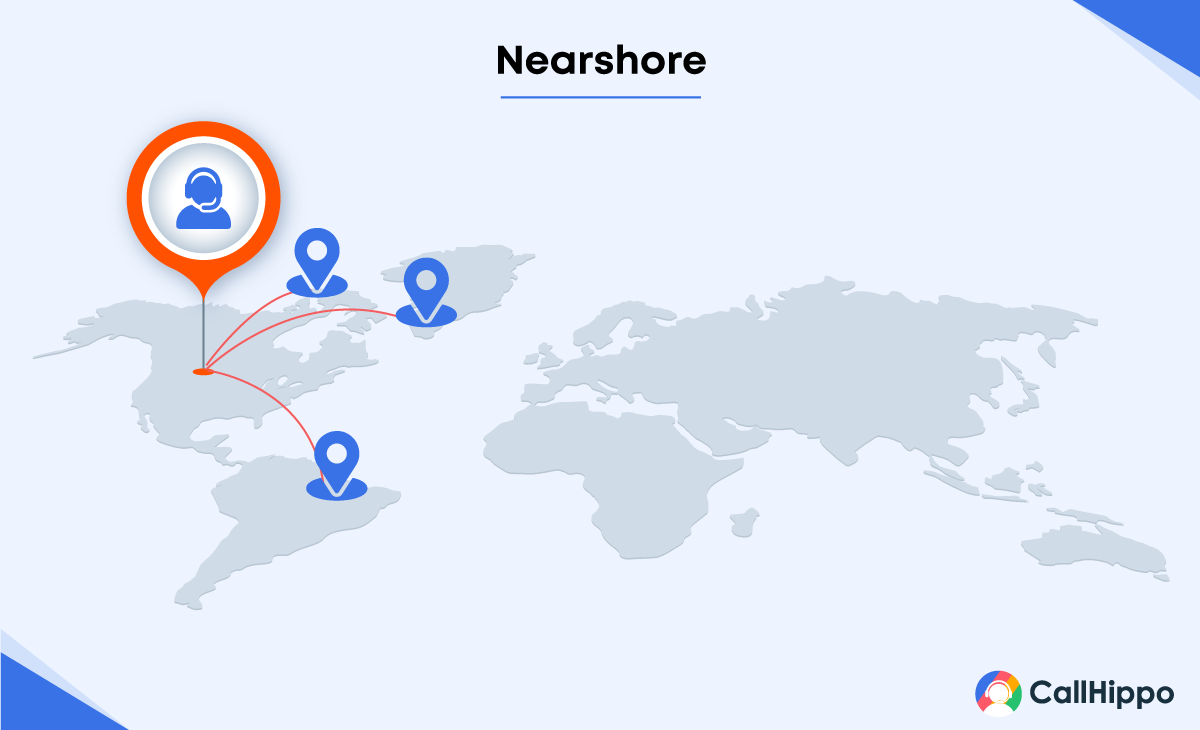
Nearshore outsourcing is a process where an organization hires service providers in a neighbouring country for any given reason, such as cost savings, to align with language proficiency, cultural values, graphical proximity, etc. For example, a company in the US outsources IT to Mexico or Canda.
3. Offshore Outsourcing
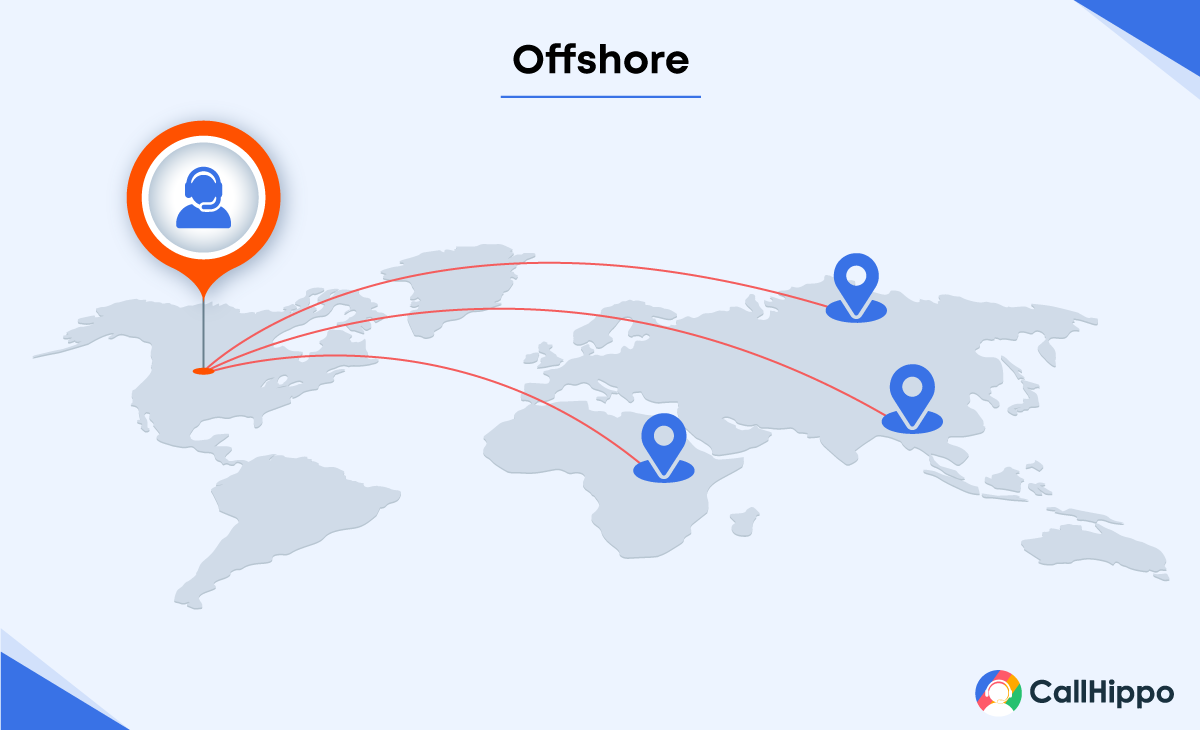
Offshore outsourcing means a company hiring a third-party service provider to conduct operations on their behalf from a foreign country. The main reason for offshore outsourcing is to control costs and achieve desired results. For example, a software development company in the US outsourcing its development operations to a developer in India is called offshore outsourcing.
Types of Call Centers
Similar to that of BPO it is essential to understand the types of call centers. As the clarity will assist you to choose which type of call center will be the most suitable for your organization.
There are three types of call centers. They are as follows:
- Inbound call center
- Outbound call center
- Virtual call center
Let’s have a quick understanding of all three types.
1. Inbound call center
Inbound call centers are those that receive incoming calls. This is majorly a service provided to customers who want to get in touch with the company or its representatives for making any purchase or registering a query regarding a purchase made. The main objective of these call centers is to assist customers in solving issues.
2. Outbound call center
An outbound call center provider makes outgoing calls on behalf of the organization. Organizations opt for these services as they are cost-efficient and assist them in reaching potential customers. The main objective of the outbound call center is to expand the clientele and increase sales.
3. Virtual call center
It is a call center where the executives can work remotely from their homes and attain customer queries. This approach has gained popularity post-pandemic, and many companies have adopted this system.
Now, you are well-versed with the types of call centers and their operability. But still, you need to understand the characteristics and benefits of a call center before opting for one. Let’s look at the characteristics of a BPO and a call center.
What are the Characteristics of BPO (Business Process Outsourcing)?
Every BPO service provider must have certain characteristics to enhance the effectiveness of the business operations and be reliable. The characteristics are as follows.
1. Cross-channel support
For today’s BPO, this is a must-have characteristic as even the slightest delay might have an adverse effect on the client, which is not feasible for any business. In a few years, digital communications system has dominated and revolutionized the manner of providing cross-channel support.
2. Secured infrastructure
As sensitive data is to be handled on behalf of the client. It is the task of utmost responsibility, and they need to effectively overlook that there is tampering with that data. The infrastructure must have the required security measures and firewalls to enable the service provider to maintain the required security standards. This will enhance the trustworthiness of the BPO provider.
3. Reliability
The provider must be transparent with the services and cost. The terms and conditions of providing services must be clearly stated beforehand, leaving no room for ambiguity. Lastly, the services must be provided in an apt manner. This will positively impact the provider’s reputation, making them more reliable.
4. Innovative
As a BPO service provider, you need to be innovative, as different clients will be having different requirements. In addition, you have to diversify your processes and use advanced methods or technology to gain efficiency and desired results. As technological advancements are frequent and every BPO provider needs to stay updated.
What Are the Benefits of Outsourcing?
BPO or call center services through outsourcing are not just cost-effective methods. In fact, outsourcing is a method to help businesses operate even quickly, scale a little smarter, and focus on the items that truly drive growth.
1. Cost Saving
59% of companies today are looking to outsource to gain some operational dollars.
Engaging an offshore provider is less expensive than engaging in-house labor. There is a significant cost savings advantage in overhead items such as infrastructure, recruiting, and training while still maintaining high customer service standards.
2. Scalability and Flexibility
Human resource outsourcing also gives you the ability to ramp up if demand skyrockets. A good example would be an e-commerce store during the peak holiday season. The store can add BPO call center agents to support orders, then reduce agent number to almost zero after the holiday season is over.
It essentially becomes a facility and employee plug-and-play to remain flexible.
3. 24/7 Support Coverage
With staff working onsite 24 hours a day, outsourcing can become a reliable partner to cover support services around the clock and provide excellent customer service. Existing customers can access support when needed, without having to wait until “business hours” to connect with support team.
4. Access to Specialized Skills
By working through one BPO company for your business, you are accessing thousands of talented professionals who can bring specialized expertise to your business in areas such as HR, Finance, IT, Customer Care, etc. You can engage the experts you need without the recruiting headache or expense of hiring and training staff.
5. Focus on Core Business Activities
When businesses outsource customer support, front office processes, or low-margin repetitive tasks, it helps your staff divert their focus to strategy, innovation, and building customer relationships. Offloading routine work creates space for creative thinking and meaningful innovation across the organization.
6. Multi-Lingual Capability
Today’s leading BPO providers are built for diversity. With multilingual BPO agents fluent in regional nuances, businesses can deliver culturally aware support to customers across the globe.
- 1Easy-to-use cloud platform
- 2Full suite of dialers included
- 3Actionable call analytics
- 4Designed for remote teams

What are the Risks Associated with Outsourcing?
Although outsourcing can be alluring and a productive method for multiple BPO services, there can be some disadvantages as well. Here are the primary risks associated with outsourcing.
1. Loss of Brand-control
A third-party person may not be able to fully represent the exact tone or values of your brand and mixed brand messaging for customers. This may lead to reduced customer engagement as well.
The fix lies in intentional alignment. Invest in onboarding and ongoing training that reinforces your brand voice, set clear communication guidelines, and run regular audits or performance reviews. Continuous development ensures every agent sounds like you, even when they’re not on your payroll.
2. Inconsistent Quality
Every outsourcing provider operates with its own quality standards, which can sometimes fall short of customer expectations. This gap often leads to inconsistent customer experiences and diluted brand perception.
To bridge that gap, establish clear KPIs, conduct regular performance reviews, and communicate expectations openly. Treat quality management as a shared responsibility, not a one-time check. The tighter the alignment, the stronger the customer experience.
3. Weak Compliance
When sourcing processes involve customer data, compliance with thorough regulations such as the GDPR or CCPA becomes non-negotiable. Any reputable BPO partners will rigorously comply with those frameworks through encryption, limited access, monitored data flows, etc.
4. Communication Barriers
Communication barriers are the most frequently documented concerns with outsourcing. Due to time zone differences or language and cultural barriers, collaboration can be slow, and customer inquiries may not be answered properly.
For this problem, thorough communication is key. Make arrangements for scheduled phone calls or meetings with your BPO partner, utilize sharing/access tools, rely on multiple communication channels, and build a relationship beyond e-mails and tickets.
5. Reduced Agility
Outsourcing can sometimes slow your response to sudden market changes. When processes are managed externally, quick pivots or adjustments may take longer to execute, leading to missed opportunities. To stay agile, build flexibility into your contracts and maintain a feedback loop with your outsourcing partner.
What are the Characteristics of a Call Center?
You need to be well-versed with the characteristics that call centers possess. Below mentioned are the essential characteristics of a call center.
1. Automatic call distribution
Automatic call distribution is an essential characteristic a call center must have. This system automatically routes callers to the appropriate individual or executive. It assists the organization in controlling the wastage of resources. Apart from that, it is time-saving and enhances customer retention.
2. Administration and analysis
It is an essential tool that assists call center managers in evaluating call duration, expenses, and other important aspects. It amplifies the decision-making process, and accurate tracking of productivity is feasible.
3. Call recording
Call recording is a feature that is a must for every call center as it can be treated as proof of conversations had in case of any escalations. The recordings can also be used to train new employees and enhance the call quality. As a result, it is the most common characteristic of every call center.
4. Integration
Call centers utilize software and hardware for calling, recording, and tracking purposes. Many call centers use PBX telephony systems for international calls. In addition, they use headsets, and recording and call tracking software are integrated with these systems for maintaining and elevating performance.
5. Interactive voice responses (IVR)
Most call centers utilize this system as it assists in routing customers to the required department according to their query. IVR offers self-serving facilities to customers, which is time-saving for both customers and executives. Petty issues can be resolved via IVR systems, and the assistance of executives is not required.
Regardless of type, every call center must have these characteristics to achieve the desired efficiency level. Let’s look at the benefits of a BPO and a call center.
What Are the Benefits of a Call Center ?
Call center services are highly beneficial if you want to enhance your customer engagement, experience, sales, etc. Here are the important benefits of a call center.
1. Budget-friendly
Call centers are effective in controlling the cost depending on the type of calling services to be availed. If outbound calling is to be done, then utilizing call center services will be highly effective in lieu of installing systems and allocating resources on-premises.
2. Time-saving
As executives can work remotely and attend to customer calls and queries, it increases productivity, and the companies have to spend very little time and money. Moreover, call centers offer 24/7 operational support, due to which queries can be resolved quickly and effectively.
3. Enhanced call quality
If a company sets up an on-premise call center, it will have to allocate resources, hire executives, provide them with appropriate training, etc. However, if the call center services are availed, all of this can be avoided as the call center has experienced staff, and as a result, the quality of the calls gets increased.
4. Credibility
By providing exemplary customer service, the company’s image will improve, and simultaneously customers will find the company more credible. Hence, call centre service providers will reduce the burden of elevating the customer experience from the organization, and they can focus on increasing their trustworthiness in the market.
What Technology Stack Is Needed for BPO vs Call Center Services?
Technology underpins both BPO and call center operations. The right stack streamlines workflows and boosts customer interaction quality.
1. CRM and Workflow Automation Tools
Customer relationship management systems such as Salesforce or HubSpot allow you to collect and administer customer data, automate repetitive tasks, and establish transparency.
CallHippo integrates with those systems to give meaning to every call to make sure your in-house team is always operating with context and your records are complete.
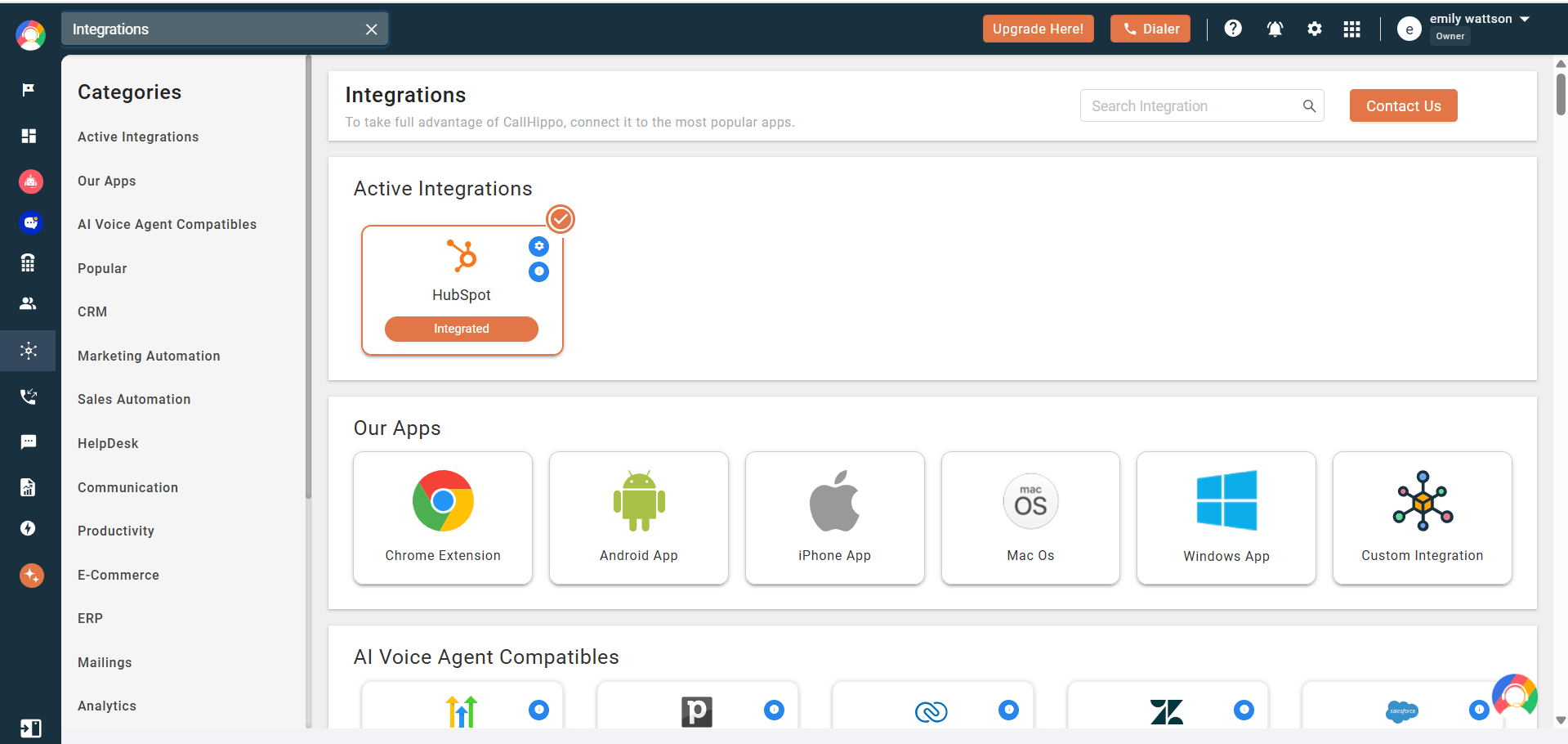
2. Cloud Telephony and Contact Center Platform
With teams often dispersed across geographies, a cloud telephony solution is essential.
CallHippo delivers features such as Smart DID Routing, global numbers, call tracking, multi-level transfer, AI copilot, and full mobile/desktop access, all built for remote and hybrid environments.
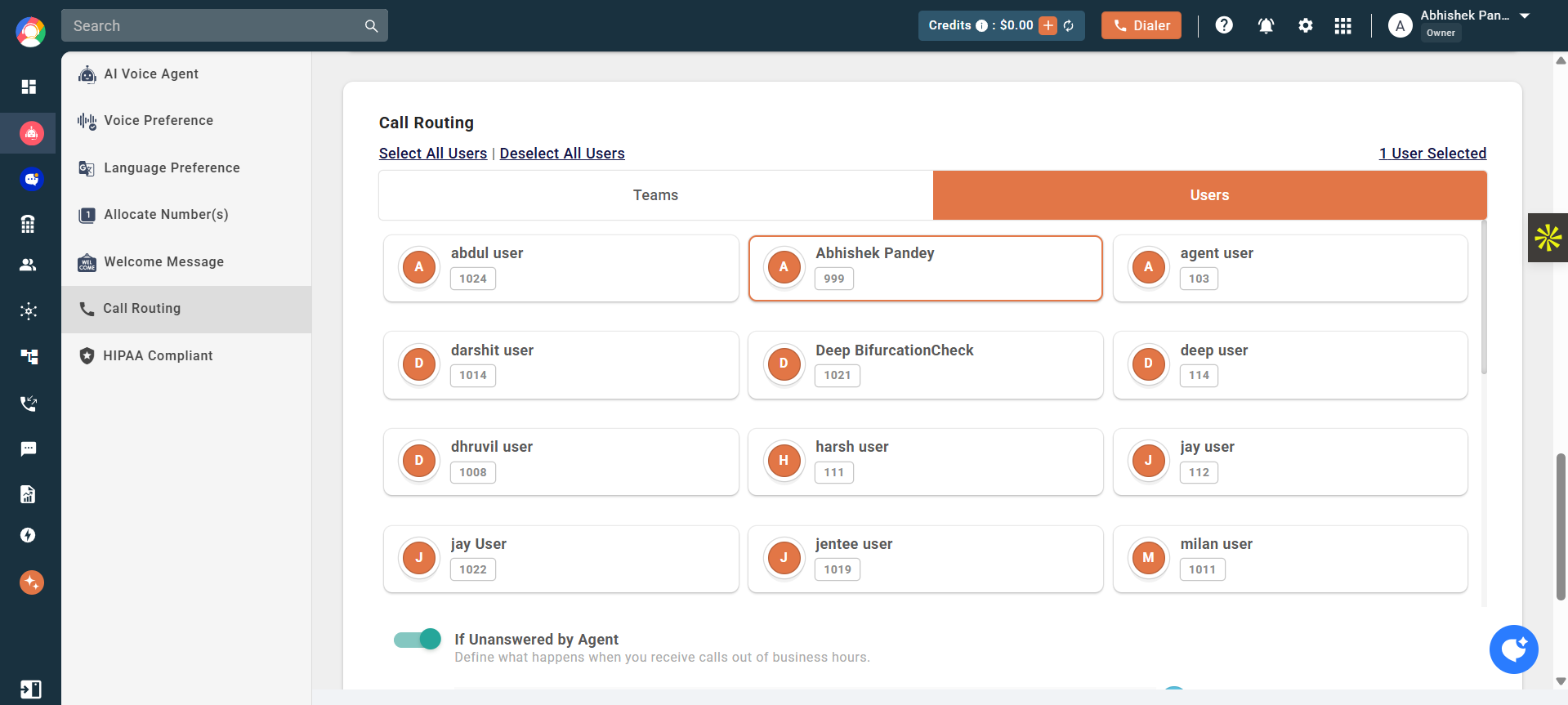
3. AI-Powered Chatbots and Predictive Dialers
The advanced technology has brought a large number of solutions for high-volume outreach. CallHippo has multiple dialers available: Predictive, Power, Progressive dialers, and Auto Dialers, all designed to improve dialing productivity while minimizing downtime.
CallHippo’s Predictive Dialers connect the agents only to live contacts; Power and Progressive Dialers serve to connect only quality calls and do so based on the agent’s pace.
4. Data Security, Compliance, and Integration Systems
When you’re outsourcing operations or handling sensitive customer data, security and compliance matter deeply.
CallHippo supports encrypted connections, restricted access controls, and integrations built to meet regulatory requirements while protecting customer trust.
5. Analytics Dashboards and Performance Tracking Tools
Measuring performance in real time is non-negotiable for outbound calls.
CallHippo’s analytics dashboards provide a comprehensive view of operations. This best call center software can track metrics such as call volume (inbound & outbound), average handle time (AHT), agent wrap-up time, wait times, caller sentiment/voice analytics, and missed-call counts.
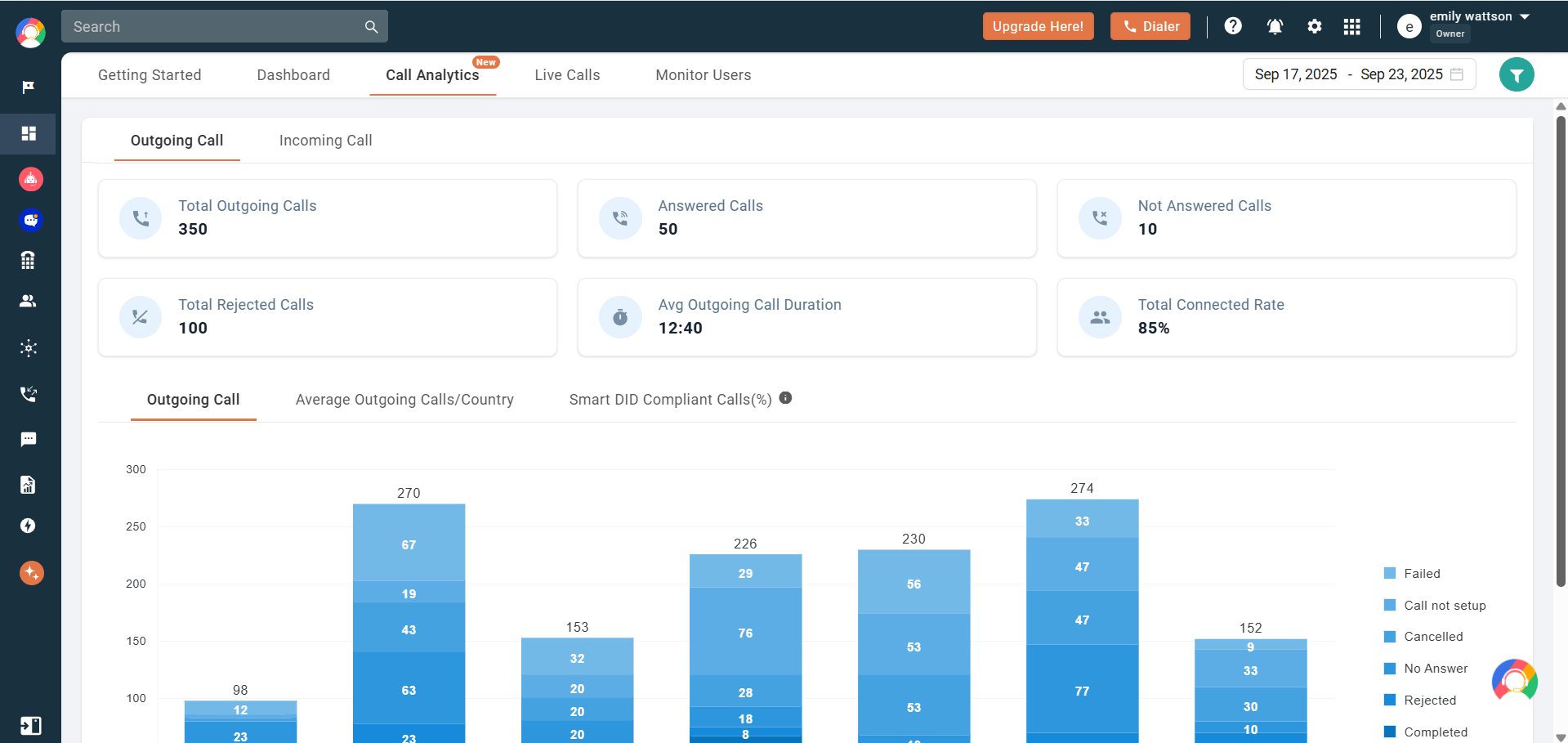
How Is Performance Measured Differently in BPO vs Call Center Operations?
While BPO and call center operations may seem similar, their performance goals differ significantly. Traditional call center phone systems measure speed, satisfaction, and service quality, while BPO call centers focus on accuracy, cost, and process efficiency.
1. Call Center KPIs
Call centers are only successful when responsiveness is consistent with the overall customer experience. Below mentioned metrics play a critical role here.
- Average Handle Time (or AHT) will provide overall efficiency patterns of agents when handling inbound and outbound calls.
- First Call Resolution (or FCR) indicates the rate of resolution of an issue in one call.
- Customer Satisfaction (or CSAT) indicates how a customer actually feels after the supportive engagement.
2. BPO Performance Measures
BPOs focus much more on accuracy and long-term efficiency.
- Process Accuracy indicates whether each task was done correctly the first time or accurately.
- SLA Compliance measures how we comply with customer agreements.
- Cost Per Transaction measures whether we are accurate or valuable, or whether we are gaining profitability.
Using these measures will enable BPO leaders to balance quality and efficiency, close gaps, and build positive working relationships.
3. Productivity vs. Outcomes-Based Performance
This is where the BPO and call center difference becomes strikingly clear. Call centers primarily operate to reinforce a productivity metric such as call volumes, response rates, time to resolution, and so on. And BPO metrics will consider both the improvement process or evidence-based measures like accuracy, compliance, ROI, etc.
Wrapping Up
BPOs and virtual call centers might be interchangeable terms for some, but their goals are different. Call centers deal with customer interactions, while BPO contact centers are primarily focused on larger operational processes.
The choice between them is based on whether you are trying to elevate customer experience or operational efficiency on the back end. Working with the right outsourcing partner ultimately allows you to turn BPOs (or call centers for that matter) into strategic levers for agility, growth, and ultimately, customer trust over time.
FAQs
1. Is BPO the same as a call center?
No, both are totally different from each other. Call centers offer services related to customers, like solving queries, registering complaints, improving customer experience, engagement, increasing sales, etc. In the past, there were BPO call centres that used to provide calling services but now there are hardly any.
However, BPO offers services related to processes that businesses follow to enhance productivity and achieve the desired goals and objectives.
2. Which is better, BPO or call center?
Both are different and cannot be compared. It totally depends on the requirement of the company. If a company wants to avail services with regard to the processes, then BPO is a viable option. If the requirement is related to offering better customer services, then call center phone system must be preferred.
3. What are some examples of call center services?
Call center services can be used for customer services, technical support, sales, marketing, billing, collections, surveys, and market research.
4. What are some examples of BPO services?
BPO services can be used for data entry, IT and software development, accounting, finance, payroll, etc.

Subscribe to our newsletter & never miss our latest news and promotions.
![Difference Between BPO and Call Center Operations [BPO vs Call Center] Difference Between BPO and Call Center Operations [BPO vs Call Center]](https://d1x9dsge91xf6g.cloudfront.net/callhippo/images/chsiteimages/difference_between_bpo_and_call_center_feature.webp)







